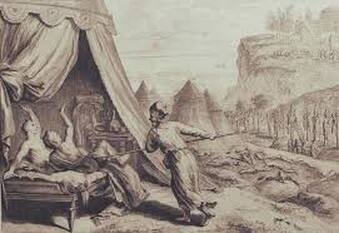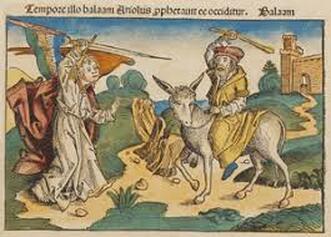
אחרי הכתו את סיחן מלך האמרי אשׁר יושׁב בחשׁבון ואת עוג מלך הבשׁן אשׁר־יושׁב בעשׁתרת באדרעי׃
These are the words Moshe spoke to all Isra'el ... after he had defeated Sichon, king of the Emori, who lived in Heshbon, and `Og, king of Bashan, who lived in `Ashtarot, at Edre`i.
(Deu 1:1-4 CJB)
The Appropriately Spoken Correction (Prov 25:11)
THE BOOK OF D’VARIM AND KING JOSIAH
The Book of D'varim was to be placed by the side of the Holy Ark. It was to serve as a rebuke and reminder of Israel's covenant with HaShem to later generations. A good example of its effect is told us in 2nd Kings 22 when seven hundred years later, due to the words in this book, King Josiah and all Israel were moved to repentance.
D’VARIM: A PEP-TALK, AND A WISELY-TIMED CORRECTION BEFORE CONQUEST
The words in Book of D'varim were spoken to the second generation of the Children of Israel in the desert, a generation that had not known Egypt. It's goal was to ready the Children of Israel before they entered the Promised Land, as well as to serve as a rebuke for them not to do as their fathers did in fearing entering the Land.
Let us see some of what the sages say about this rebuke,
(Sifre, cited by Rashi)
The Torah emphasizes that Moshe rebuked the Jewish people after he had smitten Sichon and Og. Here is how Moshe reasoned, "If I rebuke them before they enter at least part of the Land, they will say, 'What does this man have against us?' What good did he do for us? He has come only to vex us and to find pretext since he doesn't have the power to bring us into the Land.'" Therefore Moshe waited until he had conquered Sichon and Og, and then he rebuked the people.
On this principle, Rabbi Zelig Pliskin explains, "Had the people felt the Moshe's rebuke was insincere and that he had ulterior motives, his words would have been ineffective. A PERSON WILL ONLY ACCEPT REBUKE IF HE FEELS THAT THE REBUKER HAS HIS BEST INTEREST IN MIND."
We see from here that timing is a major factor in rebuke and correction. In Many instances by waiting for an opportune time to deliver an admonition a person will be more successful than he would have been had he admonished earlier.
As a good leader, Moshe understood the importance of correction at the right time,in the right place, with the right tone of voice, encased in the right format, etc ...
WISELY DELIVERED CORRECTION
Parents, teachers, coaches, trainers, religious and civic leaders are all faced with times when they need to present a correction to those in their care. This can even happen between friends, and spouses. Let us go over some generic tips about good, less good, and bad timing for corrections.
When is it a bad time to approach someone for a correction
- In the heat of the moment
- When either the corrector or the corrected are emotionally upset.
- When it makes us happy or we draw pleasure in doing it.
- Before having fully investigated and understood the issue.
- When we have a personal advantage in the person doing the right thing, which makes our rebuke insincere and motivated, and it probably is.
- Do we teach our children to be clean and tidy because you want them to develop good healthy habits that will help them in their lives as adults, or is it just because we get irritated about it and don't want to have to clean up after them?
- Do we chide our spouses or colleagues about an expense because we want to teach financial responsibility, or just because we don't agree with it and would have spent the money for something that WE want instead?
When then is it a good time to approach someone for a correction?
- After emotions calm down and we see, investigate and understand things more clearly.
- When it hurts us to do it.
- When we don't draw any personal advantage in doing it.
CORRECTION I CAN UNDERSTAND!
Here is another important point about delivering correction
There, beyond the Yarden, in the land of Mo'av, Moshe took it upon himself to expound (ba'ar/באר: to explain, elucidate, interpret) this Torah … (Deu 1:5)
The Mishna explains that the 10 Commandments were given through flames of fire in the 70 languages of the world
The Midrash also claims that Moshe interpreted the Torah in the Book of D’varim in the 70 languages of the world.
In the Book of the Acts of the Disciples, The Brit HaChadasha concurs the idea when it tells us that as soon as the Torah was written in the disciple’s hearts, It expressed itself through the disciples, in many languages. Acts 2:1-11
This all came as a reversal to the curse that fell on mankind at the time of the Tower of Babel.
This teaches us an important principle: if we speak Torah in order to teach people, we should speak it in a language that helps the recipient to receive the message.
- In their own language: If our audience is not familiar with Hebrew terminology, we should not try to impress or patronize them by using Hebrew words which are unfamiliar to them.
- In the right manner: Our Master was good at that. He themed His examples according to His audience. To fishermen, He spoke about fish and fishing. To farmers, He spoke about fields and seeds. To land owners He made analogies using the theme of inheritances, as well as issues pertaining to servants and master relationships.
- Yeshua spoke a lot to the poor, and in so doing used parabolic imagery to help his less educated hearers understand. All too often our inferiority complex gets the better of us and we try to impress others and/or patronize them, to give ourselves some importance by flaunting some sort of knowledge. But he who really knows, never feels the need to boast or brag, because the more he know, the more he should know that he doesn’t know.
Gently: Paul admonishes:
"... and a slave of the Lord shouldn't fight. On the contrary, he should be kind to everyone, a good teacher, and not resentful when mistreated. Also he should be gentle as he corrects his opponents. For God may perhaps grant them the opportunity to turn from their sins, acquire full knowledge of the truth, come to their senses and escape the trap of the Adversary, after having been captured alive by him to do his will." (2Ti 2:24-26 CJB) "... but we urge you, brothers, to confront those who are lazy, your aim being to help them change, to encourage the timid, to assist the weak, and to be patient with everyone. See that no one repays evil for evil; on the contrary, always try to do good to each other, indeed, to everyone."(1Th 5:14-15 CJB)
As Moshe was patient with Israel,
As our Master is patient with us,
May we be patient with one another.
.May we also remember His precious words,
"... the measure with which you measure out will be used to measure to you.
Why do you see the splinter in your brother's eye but not notice the log in your own eye? How can you say to your brother, 'Let me take the splinter out of your eye,' when you have the log in your own eye?
You hypocrite!
First, take the log out of your own eye; then you will see clearly, so that you can remove the splinter from your brother's eye!" (Mat 7:2-5 CJB)
ר,גל
R' Gavriel Lumbroso







 RSS Feed
RSS Feed